Japan's Official Development Assistance White Paper 2012
Section 2 Measures for Each Priority Issue
Poverty Reduction, Sustainable Growth, Addressing Global Issues, and Peace-Building are positioned as the four priorities in the ODA Charter. This section introduces Japan's recent efforts in relation to these challenges.
1. Poverty Reduction
(1) Education
Education plays an important role in the socio-economic development that is needed for poverty reduction. It also enables individuals to develop their own potentials and capabilities, as well as to live with dignity. Education fosters understanding towards other people and different cultures, and forms the foundation for peace. However, across the world approximately 61 million children are still out of school. Approximately 800 million adults do not have minimum literacy (the ability to read and write short, simple sentences), two-thirds of which are women.(Note 3)
In order to improve this situation, the international community has been working to achieve Education for All (EFA)*. In September 2012, the UN Secretary-General announced the Education First* initiative and called for the efforts of the international community to promote the spread of education.
<Japan's Efforts>
Emphasizing "nation-building" and "human resource development," Japan has been providing developing countries with a broad range of support for education, including the enhancement of basic education*, higher education, and vocational training. In 2002, Japan announced the "Basic Education for Growth Initiative (BEGIN)". In accordance with BEGIN, Japan provides assistance that combines the equipment and facilities aspect, such as constructing schools, with the knowledge and expertise aspect, such as training of teachers, with priority emphasis on (i) ensuring access to education, (ii) improving the quality of education, and (iii) improving education policies and educational administration systems.
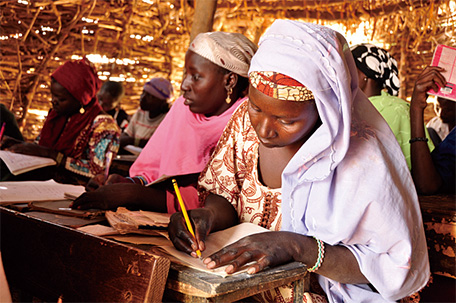
Girls at an elementary school in rural Niger study the alphabet during their lunch break (Photo: Seico Tamai)
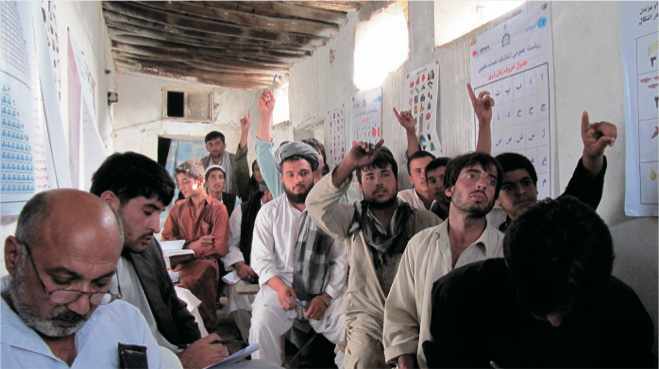
Men studying reading, writing, and arithmetic in a literacy education in Afghanistan. Basic education improves the lives of individuals, helps them respect themselves, and in turn, contributes to societal development (Photo: JICA)
In 2010, Japan released the "Japan's Education Cooperation Policy 2011-2015," as its new education cooperation policy to be implemented from 2011 through 2015, the target date to achieve EFA and the Millennium Development Goals (MDGs). (Goal 2: Achieve universal primary education, Goal 3: Promotion of gender equality and empower women.) The new policy promises that over five years from 2011 Japan will provide $3.5 billion, focusing on (i) basic education; (ii) post-basic education (secondary education following the completion of primary education, vocational training and education, higher education); and (iii) education for vulnerable countries affected by conflicts or disasters. Japan aims to establish quality educational environment, paying particular attention to alienated children as well as vulnerable countries, and other areas where it is difficult to deliver the assistance, and provides aid to enable individuals who have completed primary education to continue further education. Through this assistance, at least 7 million children will be able to enjoy the high-quality educational environment. In addition, Japan has proposed "School for All," a basic educational aid model that is designed to provide access to education for all children. As part of its new policy, working together with schools, local communities, and governments, Japan is engaged to improve the learning environment in a variety of aspects such as (i) quality education (improving the quality of teachers); (ii) school based management; (iii) inclusive education for children disadvantaged in attending school due to poverty, gender discrimination, disability, and others; and (iv) safe learning environment (provision of school facilities, health and sanitation). At the breakout session for education at the MDGs Follow-up Meeting held in Tokyo in June 2011, the theme of improving quality of education was discussed and compiled an outcome document with good practices.
Also, Japan has been an active participant in the efforts to discuss and reform the Global Partnership for Education (GPE)* (formerly known as FTI: Fast Track Initiative), which lays out the international framework for achieving universal primary education by 2015. Japan served as a co-chair and a member of the Steering Committee since January 2008, due to its G8 presidency and also served as a director in 2012. Further, Japan's contributions to FTI-related funds from FY2007 to FY2011 totaled approximately $10.9 million.
At the International Symposium on Self-Reliance and Sustainability of EFA in April 2008, Japan delivered a message stressing the need for more substantial basic education in quality and quantity, improved assistance to the various stages of post-primary education, collaboration between education and other fields, and efforts that allow the international/domestic participation of all stakeholders. A number of specific efforts were announced at the Fourth Tokyo International Conference on African Development (TICAD IV) in May 2008. These include the construction of 1,000 primary/secondary schools and 5,500 classrooms support for the capacity building of 100,000 math and science teachers, and the expansion of support for school management improvements at 10,000 schools over the course of five years starting in 2008. As of March 2012, 874 primary/secondary schools with 4,589 classrooms have been constructed, support for capacity building has been provided to approximately 400,000 math and science teachers, and school management improvement projects have been implemented at 18,376 schools. Furthermore, in order to help improve the substance and quality of education in the Asia-Pacific region, Japan is contributing to a trust fund to the United Nations Educational, Scientific and Cultural Organization (UNESCO) to implement projects for improving the management capacity of community learning centers.
Afghanistan is a country with an estimated illiterate population of approximately 11 million (about 40% of the population) due to the impact of about three decades of civil war. The government of Afghanistan aims to provide 3.6 million people with literacy education by 2014. Since 2008, Japan is contributing to the promotion of literacy education in Afghanistan with a total of approximately ¥3.3 billion in grant aid through the UNESCO to provide literacy education to 600,000 people in 100 districts of 18 provinces of Afghanistan.
In recent years, Japan has been promoting transnational networking of higher education institutions and joint research projects among neighboring countries. Japan also supports human resource development in developing countries by various measures such as accepting international students to Japanese institutions of higher education in accordance with the "300,000 International Students Plan."
Moreover, Japan strives to make it easier for Japanese in-service teachers to go overseas as Japan Overseas Cooperation Volunteers (JOCV) under the Special Program for School Teachers*. In-service teachers dispatched to developing countries contribute to education and social development in their dispatched countries, and make use of their experiences in the field of Japanese education after their return.
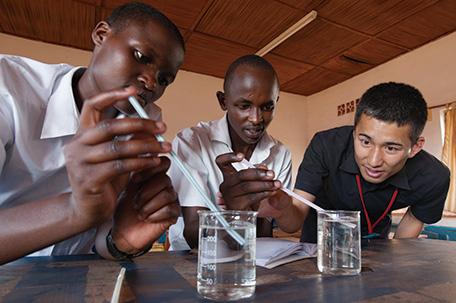
A science camp planned by science and math teachers in Gahini, Rwanda (Photo: Kenshiro Imamura/JICA)
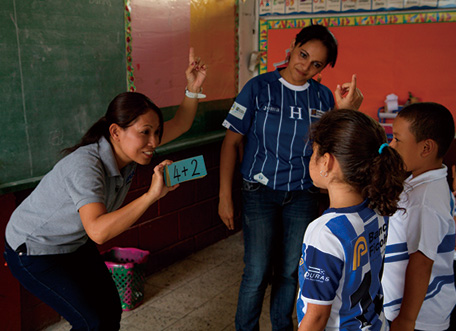
JOCV teaches arithmetic in Honduras (Photo: Carlos Aguilar)
- *EFA: Education for All
- Education for All (EFA) is an international movement that aims at ensuring everyone in the world has the opportunity to receive at least a basic education. The five main organizations involved in EFA are the United Nations Educational, Scientific and Cultural Organization (UNESCO), the World Bank, the United Nations Development Programme (UNDP), the United Nations Children's Fund (UNICEF), and the United Nations Population Fund (UNFPA), with UNESCO serving as the overall coordinator.
- *Education First
- An initiative on education announced by the UN Secretary-General in September 2012. Laying foundations for the fundamental right of education in social, political, and developmental agendas, it promotes international efforts intended to spread education. In particular, it prioritizes school attendance of all children, the improvement of education quality, and fostering global citizenship for the individuals to participate actively in the efforts to tackle global issues.
- *Basic education
- Educational activities designed to enable individuals to acquire the knowledge, value, and skills needed to live. Basic education mainly refers to primary education, lower secondary education (equivalent to the Japanese junior high schools), pre-school education, and adult literacy education.
- *GPE: Global Partnership for Education
- A framework formerly known as FTI (Fast Track Initiative), for international cooperation established under the leadership of the World Bank in 2002, in order to achieve universal primary education by 2015 that is included in the MDGs and the EFA Dakar Framework for Action (formerly known as FTI: Fast Track Initiative).
- *JOCV under the Special Program for School Teachers
- The program is designed to encourage in-service teachers to participate in international cooperation. Teachers who are recommended by the Ministry of Education, Culture, Sports, Science and Technology (MEXT) to JICA are exempt from the preliminary technical test, and the period of dispatch is set for two years (compared to the usual cases which are for two years and three months), beginning in April and ending in March, to match the Japanese school year.
Note 3: Source: "EFA Global Monitoring Report 2012" (UNESCO)
●Burkina Faso
School Management Committee Support Project
Technical Cooperation Project (November 2009 - Present)
In 2008, Burkina Faso enacted laws and regulations related to the establishment of school management committees and promoted to establish them in primary schools across the country. Members of the school management committee are elected from parents, local residents, and teachers. This project aims to improve school environments through planning and implementing school activities by community participation based on the committees. In Burkina Faso, however, there was a lack of sufficient knowledge and experience on how to manage the committee and the roles of government and residents.
In Niger, Burkina Faso's neighboring country, Japan has been implementing the 'School for All' Project since 2004 under the aim of improving the quality of school management committees. Based on this successful experience, Japan has also been implementing a school management committee support project in Burkina Faso from 2009 to 2013.
The activities conducted at approximately 1,500 schools in three different states have drawn on the funds and manpower of local communities to successfully equip schools with classrooms, wells, toilets, and other school facilities. By carrying out supplementary lessons, the quality of education has now been improved. Also, the learning environments have been enhanced through measures such as the provision of school meals. Having observed the effectiveness of these activities, the Burkina Faso Ministry of Education decided to expand Japan's assistance project to approximately 12,000 primary schools throughout the country as its own activity.
(As of December 2012)
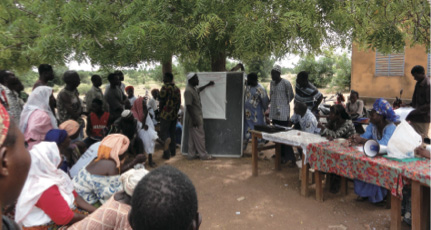
Community participation in a school management committee meeting. (Photo: JICA)
●Pakistan
Project for Strengthening of DAE Mechanical and Architecture Departments in GCT Railway Road of Punjab Province
Grant Aid (July 2011 - Present)
The government of Pakistan is promoting manufacturing, construction, and a number of other industries for stable economic growth. However, the enrollment rate for 14 to 19 year-olds in technical education/vocational training school stands at 1.5%, which is extremely lower the rates of between 6% and 20% seen throughout the rest of Asia. Additionally, inadequate educational content and deteriorating facilities have hampered the country's ability to train technical personnel to meet industry demands. Faced with these circumstances, the government of Pakistan has worked to improve the situation, prioritizing the reconstruction of technical education and vocational training. The provinces of Pakistan have set forth on the establishment of advanced model schools in specific fields.
Punjab's city of Lahore is second biggest city only to Karachi among industrial cities in Pakistan. The Government College of Technology Railway Road Lahore located in the city has been recognized as Punjab's model school. Since 2008, this college has been working with Japan's Technical Cooperation Project for Development of Center of Excellence (CoE) for Technical Education to revise its curriculum, train its instructors, strengthen the linkages with industries and enhance the ability of education and vocational training. However the college lacks the training equipment and classrooms called for in this revised curriculum. Therefore this grant aid project has been used to support the construction of facilities for the Department of Architecture and to modernize training equipment for both the Department of Architecture and the Department of Mechanical Engineering. These improvements will allow the college to provide high quality education and training for approximately 500 students a year. Consequently, it is expected that human resources equipped with the types of advanced technical skills industry seeks will increase and promote youth employment which will lead to a stabilization of public order and a bettering of social situations in Pakistan.
(As of December 2012)
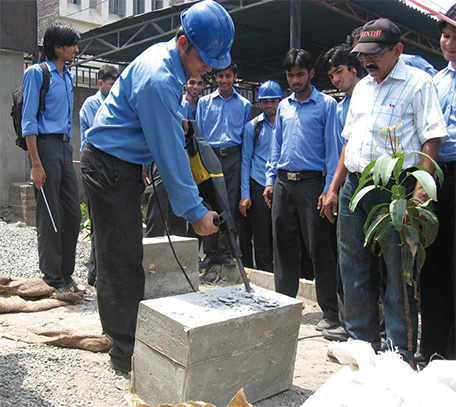
Architecture students practice destroying concrete. (Photo: JICA)
